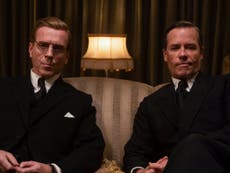Strike: Troubled Blood review – This drama should be cherished. It’s the BBC at its best
Tom Burke is back as the hard-drinking detective, with Holliday Grainger as his resourceful sidekick
Your support helps us to tell the story
From reproductive rights to climate change to Big Tech, The Independent is on the ground when the story is developing. Whether it's investigating the financials of Elon Musk's pro-Trump PAC or producing our latest documentary, 'The A Word', which shines a light on the American women fighting for reproductive rights, we know how important it is to parse out the facts from the messaging.
At such a critical moment in US history, we need reporters on the ground. Your donation allows us to keep sending journalists to speak to both sides of the story.
The Independent is trusted by Americans across the entire political spectrum. And unlike many other quality news outlets, we choose not to lock Americans out of our reporting and analysis with paywalls. We believe quality journalism should be available to everyone, paid for by those who can afford it.
Your support makes all the difference.Strike: Troubled Blood really is an extraordinarily fine crime drama, where a range of exceptional talents come together to create something that is actually greater than the sum of its very formidable parts. That is something rare and to be cherished. And indeed watched, and I can unreservedly commend this four-parter as a highlight of your festive viewing (along with the latter stages of the World Cup, obviously). It starts brilliantly, but gets better, and there are some surprising and compelling star performances to come.
It’s the latest adaptation, by Tom Edge, of the Strike detective works of JK Rowling (under her pseudonym Robert Galbraith, and she is also executive producer), and probably the best. Tom Burke is once again in the title role of Cormoran Strike, the gruff but clever private investigator. Strike is an ex-soldier with a touch of PTSD, a bit of a drink problem, and a troubled childhood. And his affection and respect for his resourceful business partner, Robin Ellacott (Holliday Grainger) always threatens, or promises, to evolve into something akin to love. “Akin to”, that is, because Strike is the sort of bloke who seems never-ready for love, and certainly not dressed for it. He makes Columbo look smart. Instead, Strike is permanently attuned to the depraved aspects of human nature, which he’s witnessed in war and peace. He looks and sounds sardonic, if not depressed, but that’s always appropriate for a telly detective; otherwise they’d all be breezy types like Michael Mcintyre or Alan Titchmarsh, and that would never do. The nightmare topping for the Strike backstory is that his stepmother has had a diagnosis of stage 4 ovarian cancer. So, yes, it’s all slightly miserabilist, but you can almost feel Burke revelling in it. Someone should buy him a pint. Or maybe not.
In the opener of the new series, Strike, as a celebrated detective, is accosted by a woman as he emerges, refreshed, from a session in the boozer. Almost hopelessly, the anguished Anna (Sophie Ward) pleads with Strike to investigate the 1974 disappearance of her mother, Dr Margot Bamborough, (played in the flashbacks by Abigail Lawrie). Strike takes the very cold case on, and starts to gather the evidence. Old case files are assembled, including the notes of the original detective who went mad during the inquiry. Elderly surviving witnesses, workmates and relatives are tracked down, and… there’s really not much to go on. Or, rather, too many possible suspects who are either dead, senile, disappeared, uncooperative or downright dangerous, including a serial killer around at the time. From the archive footage of news reports, home movies, and the flashback reconstructions, we learn that Margot was a kind, conscientious professional, a feminist of her day, but beset by predatory or unreliable men, including in her unhappy marriage, various flings and the thuggish, druggy blokes who hang around her surgery. Well, it was the 1970s.
As with all telly detective series, at least some of the filming has to take place somewhere breathtakingly gorgeous, in this case Cornwall, though the action is mostly submerged in the grim and grimy backdrop of 1970s London, which adds a stark contrast. Director Sue Tully (Michelle Fowler in EastEnders half a lifetime ago) makes the most of the backdrops and we’re also treated to the usual BBC attention to period detail, right down to the evocative opening title sequences. The only slightly puzzling note is why Robin goes around in a knackered 60-year-old Land Rover. Eccentric classic cars are often a staple of the genre, but that’s just bizarre. Anyway, this is superb Sunday night viewing, and has a highly crafted, sinister, intriguing and, at times, Satanic quality that should keep you enthralled.
Strike: Troubled Blood, in other words, is the BBC at its best, and now, as in the 1970s, the corporation is one of the few things in this benighted nation that actually works and is world-class. God only knows why this government wants to casually destroy it. A real murder mystery, that.



Join our commenting forum
Join thought-provoking conversations, follow other Independent readers and see their replies
0Comments